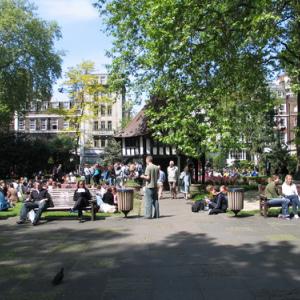Donald Heinz is professor of Religious Studies at California State University, Chico and a Lutheran minister.
Posts By This Author
Reclaiming the Commons
The commons was the name for the public space shared by all in New England towns. It is the root of commonwealth, a nice term for an entire civic entity, like a state, in which every citizen is viewed as a stake-holder. Its values are the opposite of those decried in the lament “private wealth and public squalor.” The commons are the opposite of gated communities.
Today, there are two crises of the commons — one on the right and one on the left. One is indifference to the commons, even starving the commons. This means the demise of “social capital” (the sum total of all social networks and human investments in a community or polity) and civic values shared by all, and their surrender to utilitarian individualism and the dominance of the market. The other is the argument over what discourse style is appropriate to the commons — what language should be spoken and what subjects allowed in public life. Hint: lucid rationality is in, religion is out.
Unexpected Grace in Les Miz
For many centuries Christmas Day worshippers have been hearing these words as their New Testament reading: “For the grace of God has appeared, bringing salvation to all” (Titus 2:11). Grace, everyone used to know, is foundational to the Christian Gospel.
But this Christmas I’m noticing the surprising version of grace in Les Miserables, already seen by 60 million people as a musical and now as a film. Victor Hugo’s novel may be seen as a story of grace transforming in the life of the common man Jean Valjean and grace rejected in the life of the rigid functionary Javert.
As the story begins, Jean Valjean is being released from 19 winters of imprisonment for having stolen some bread to save his sister’s son from starving. But in the eyes of Javert, Valjean will always be a thief, which is his nature, because he has not learned the meaning of the law. Crushed under this ideological overlay, Valjean sees himself as a slave of the law — in a way remarkably similar to that of St. Paul, who makes grace and law antithetical. The chorus confirms it: “Look down, you will always be a slave.”
In his first job after prison, Valjean is deliberately underpaid. When he objects, the boss says: “Why should you get the same as honest men like me?” (Jesus once told a parable about laborers in a vineyard to open people’s eyes to grace.) Valjean concludes that society has closed every door to him. When he is refused lodging, the innkeeper says: “We’re law-abiding people here. Thanks be to God.” The conservative identification with the law is commonly made in alliance with God, while Victor Hugo seems to understand that the Christian vision identifies grace, not law, with God.

